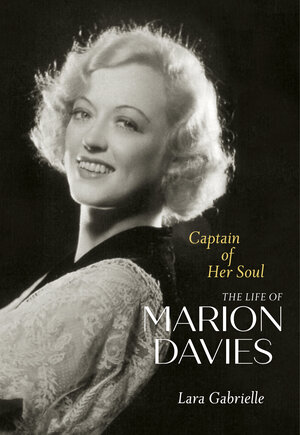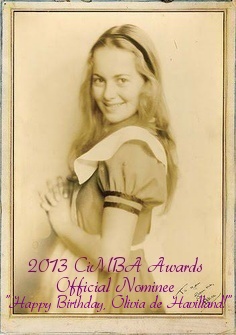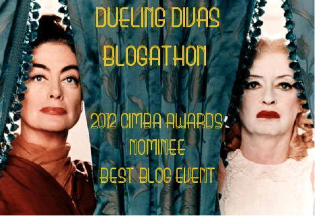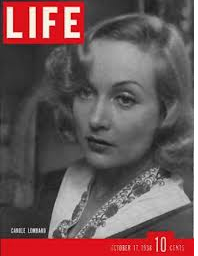
By Lara Gabrielle Fowler
A supremely gifted comedienne and talented impressionist, Marion Davies’ name should be indelibly ranked among the top screen comics. Displaying a comedy that seemed to be an early precursor to screwball (in many ways her presence and comedic timing is not unlike that of Carole Lombard), she had the potential to be a great comedic star. And yet even among devoted classic film fans, the name Marion Davies does not come up often in conversation. If she is mentioned at all, it is normally in the context of her ostensible inspiration for the character of Susan Alexander Kane in the immortal Citizen Kane, or for her 32-year relationship with William Randolph Hearst. She claimed to have wanted to maintain a relatively low profile, and for the most part that’s what happened until she ultimately left Hollywood in 1937 to devote her time to Hearst and events at his San Simeon ranch. Davies seemed to have little interest in Hollywood, and believing that she never really had any talent, often wondered how she ended up in the business. Davies could not have been more wrong in her perception about her acting abilities–a very bright talent, she was particularly known for her spot-on impressions, whether adopting a heavy French accent in Marianne or donning impromptu movie star ensembles in The Patsy.
Marion Davies imitating popular stars in The Patsy (1928).
She is one actress who, had she had more interest in being one, could have been an unusually bright star in the Hollywood firmament. As fate would have it, however, she became known instead as the hostess to international luminaries at Hearst Castle in San Simeon, and for her relationship with publishing magnate William Randolph Hearst, who was still legally married. They remained together until Hearst’s death in 1951.

As a teenager.
Born Marion Cecelia Douras in Brooklyn on January 3, 1897, she moved with her family to Gramercy Park and grew up in Manhattan, the youngest of 5 siblings. When Marion was a child, the family changed their last name to Davies after seeing a real estate sign sporting the British name, which was considered more advantageous than the curiously foreign “Douras.” Thus the Douras family became the Davies family.
Marion’s schooling was haphazard, as the stutter that marked her speech excluded her from any Manhattan school, and according to Marion she was eventually relegated to go abroad to a convent school in France which she hated. Biographer Fred Lawrence Guiles disputes this, saying there is no evidence that Marion went abroad, but in any event we know that Marion’s schooling was broken up due to the effects of her stutter. School proved to be dull for Marion anyway (she had a very keen mind, and was often bored) and she soon quit school to begin a career as a Ziegfeld girl.

The same year she was signed with Ziegfeld, she made her screen debut in a fashion newsreel followed by her first feature, Runaway Romany, the following year. By 1918 she had already become a bona fide star, and people were starting to notice her–including newspaper tycoon William Randolph Hearst. Hearst was so taken with her onscreen that he began to assume personal responsibility for continuing her career, and in the same year founded Cosmopolitan Pictures as a sole effort to promote Marion Davies. During this time, they also began a real-life romance. Hearst built for Davies an elaborate house on the Santa Monica Beach (that now exists as the Annenberg Beach House), but before long Davies was living full time with Hearst at his San Simeon castle. Davies’ relationship with the already-married William Randolph Hearst was called “the worst kept secret in Hollywood,” and as Hearst’s Catholic wife refused to get a divorce, that’s the way it stayed.

Davies wanted to continue honing her talents as a comedienne with United Artists, but by now Hearst was so tied up in Davies’ career that he was essentially the sole proprietor of her talent. Disapproving of her comedic roles, he promoted her above all in costume dramas, but still allowed her a bit of room to make the comedies she so longed to do coming in the form of The Patsy and Show People. Her career in the 1920s was almost completely dictated by Hearst, but another large influence came in the form of King Vidor, who directed Davies in both of the above films and saw Davies’ natural gift for comedy. He had attended many parties with Marion and incorporated her ebullient, vivacious offscreen personality into his direction of her. Due to Vidor’s help, she was able to realize in a small way her desire to be a comedienne.
The coming of sound proved to be a nerve-wracking time for Marion. She later said “I couldn’t act, but the idea of silent pictures appealed to me because I couldn’t talk either.” In silent movies, her offscreen stutter was a non-issue. A sound film, however, had the potential to ruin her career. Out of necessity, she dove into the world of sound and learned, to her surprise, that her stutter miraculously disappeared when she was onscreen. Her career survived and she made several successful sound films in the early 1930s, including Polly of the Circus (1932) and Peg O’ My Heart (1933), which was later turned into a Lux Radio Theater production in which Marion starred.
Polly of the Circus.
She made her last film, Ever Since Eve, in 1937 and from that day forward, she devoted herself exclusively to Hearst and played hostess at all the lavish parties Hearst threw at San Simeon. During these years Marion, who was always known as a considerate and caring individual and of whom Tennessee Williams once said “Marion Davies makes up for the rest of Hollywood,” developed a reputation for extreme generosity. Financing the complete education of a friend’s daughter, giving away jewelry, expensive gifts and often slipping such gifts surreptitiously into friends’ pockets at parties, Marion was generous to a fault. Even those who disapproved of Marion’s relations with Hearst (such as established Catholics Irene Dunne and Loretta Young), called her “one helluva dame.” When Hearst’s finances began to slip in the 1930s, Marion began to support him with her own money, continuing to do so until the day he died. After 35 years with Hearst, Marion decided not to attend the funeral out of respect for his family.
Eleven weeks after Hearst’s death, Marion married for the first time, to a man named Horace Brown. It was not a happy marriage, and Marion twice tried to file for divorce, but legally it lasted until Marion’s death in 1961 from stomach cancer. Though trapped in an unhappy marriage, the generosity that was so evident in her years with Hearst continued on–in 1952 she donated nearly $2 million to found a children’s clinic at UCLA, one that is now called the Mattel Clinic. She was also active in the prevention of childhood diseases and in recognition of her efforts, part of the UCLA Medical Center is now called the Marion Davies Clinic.

After Hearst’s death, Marion recorded audio tapes in preparation for a memoir. The tapes were turned into The Times We Had, a rather stream-of-consciousness tribute to Marion’s years with Hearst. It is a lovely read. Though it cannot be considered a memoir per se, it is clearly a labor of love and I would highly recommend it.

Though Davies never recognized her own talent, I consider her to be one of the brightest stars whose light was barely visible. Had she wanted it more, and had she had the freedom to choose her own way, she could have been one of the screen’s greatest and most legendary comediennes.
See you next time!



























_03.jpg)


Thank you! I have enjoyed her work, the little I have seen, and read elsewhere she was a very special person. I am curious, and in anything I have read it hasn’t been addressed. Why, after a long and devoted relationship with Mr. Hearst, and being independent of means, why would she marry so soon after his death? She didn’t seem to mind her ‘status’ while he was alive (perhaps she did, but she remained), could that have changed after he died? Thank you if you have any insight!
Hi! Yes, Marion was universally beloved in Hollywood, she was described by everyone as being just a very sweet, naturally kind and considerate person. I’m really not sure of why she married so soon after his death, or even how she even met her husband. The situation with Hearst was so unusual, I don’t know what their agreement was about…seeing other people? They weren’t married, and technically it was all supposed to be a secret, but they didn’t really care about keeping it one so who knows what their arrangement was. She doesn’t mention anything about Horace Brown in her book, and I haven’t read anything about him other than he was kind of manipulative and encouraged her to drink to excess. Bizarre.
Yes, bizarre, considering he didn’t allow alcohol, or over imbibing, at Hearst Castle. I have read those that got ripped were immediately asked to leave and banned, whether true or otherwise. I have ‘started’ to read many a star bio, and been disappointed because the writer often is only rehashing newspaper articles, magazine stories, nothing that reveals motivation or private thoughts. Yes, I know that’s tough to do. There doesn’t appear to be much written about her. A complex relationship. I had to laugh, a reader of of a book listed on Amazon remarks, in 2012? that it was a good book although she didn’t condone living with or having an affair with a married man! Most of us have a much more liberal attitude today! Again, thank you! I look forward to your posts!!!!
Beautiful tribute. I enjoy your post so much and always learn so much!
There is basically NOTHING written about her, except The Times We Had and one biography written in the 1970s by Fred Lawrence Guiles. She is one of the people about which I would be most interested in writing a biography, if I ever wrote one. Her relationship with Hearst was socially complicated to say the least, but they were devoted to each other. I think he was the love of her life and vice versa. From everything I’ve read, Marion was completely incapable of thinking in terms of the financial benefits a relationship with a newspaper tycoon would provide. Nor did she need any of his money anyway. They were soulmates, plain and simple.
I’m so glad you enjoyed it! She is a fascinating personality, isn’t she?
What an enjoyable post! Well done! I think Marion never got the credit she deserved so I’m always happy to catch tributes to her like this. I agree – she deserves a great biography as she led a life like no other.
It’s too bad Hearst was so adamant about putting her in drama roles. Her talent was comedy, and it’s good she got to display that. Lovely piece about her!
Lara – a nice summary of Marion’s career. I agree, and I think she was the best comedienne of her day, at a time when such roles were not much in demand. She was a fine person too and deserves a higher reputation.
Did marion davies choose not to attend the funeral of WR ‘out of respect for the family?’, or because she knew that her presence would not have been welcomed by his 5 adult sons and his still very much legal wife? And as such she would have felt like a fish out of water, not even being able to take any part in the funeral service and its arrangements?. Just wondering• Cause I have read where the same thing seem to take place with katherine hepburn and her longtime lover and orson welles and his long standing sweetheart•
It was a combination of the two. She knew that there would be people there who would shun her, but she also had legitimate respect for the family outside of her own concerns. Marion was no dummy, she had a keen sense about people and was smart about where she went and didn’t go, what she did and didn’t do. She knew who she was and where she stood.